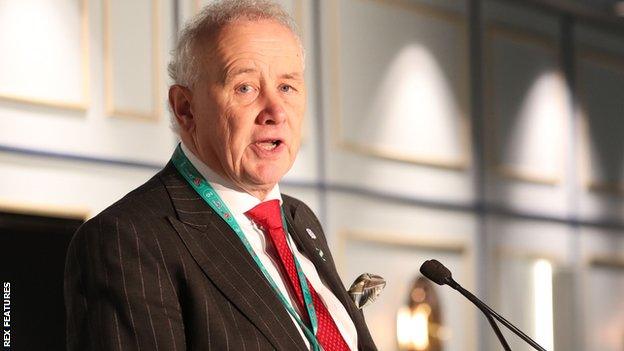Coronavirus: EFL chairman Rick Parry says clubs should 'reset' after pandemic
- Published

Former Liverpool chief executive Rick Parry was named as the EFL's new chairman in September 2019
English Football League clubs should aim to "reset" their business models following the coronavirus pandemic, says EFL chairman Rick Parry.
On 18 March, the EFL said it would release a £50m short-term relief fund to help clubs with cash-flow issues.
There have been calls for the Premier League to help the lower leagues, with the £50m labelled "nowhere near enough" by Colchester chairman Robbie Cowling.
"I'm not a fan of the begging-bowl culture," Parry told BBC Radio 5 live.
"[Rather than] just looking for handouts, it's better to go with a self-help mentality, saying 'this is what we've done, this is the problem that we find ourselves in, so how can we all help to produce a better future?'
"I think it's much better, in dialogue with the Premier League, to talk about sustainable futures and how we might be able to have a reset going forward."
Former Sheffield Wednesday and Burnley manager Brian Laws has been among those to urge top-flight stars to donate some of their wages to struggling colleagues.
Ivor Heller, commercial director at League One club AFC Wimbledon, suggested Premier League players should offer 20% of their salaries to help the lower levels of the pyramid.
"The players themselves should see, if they could give up 20% of their wages to go to grassroots footballers further down the pyramid, that could save everybody," Heller said.
"That doesn't seem like too big an ask. I do not begrudge people earning huge money in normal times, I don't.
"The true fact of it is though, if you're earning £100,000 a week and you can't survive on £80,000 a week, you've got something very badly wrong in your life."
'If coronavirus doesn't focus minds on finances, what will?'
But Parry urged a more sustainable solution for the EFL's 71 member clubs, highlighting the widespread financial losses that have been incurred prior to the pandemic starting.
"We've already been looking at measures to control costs. In the Championship, wages represent 107% of turnover of clubs," Parry continued.
"That is completely and utterly unsustainable in any climate. In this climate, it comes home to roost very quickly when there's no money coming through the door.
"We need to have better cost-control measures. I'm sure we will because, if this doesn't focus minds, frankly, what will."
Kieran Maguire, a football finance expert from the University of Liverpool, added: "The gap between the Premier League and the Championship is £100m a year and that encourages casino-style ownership.
"In does mean some owners take a very risky approach. They're effectively twisting on 19.
"You can't run a business on a long-term basis if you're going to be spending £107 in wages for every £100 that comes through the door."
Knock-on effects 'could last 18 months'
Parry also warned that the impact of the coronavirus could be long-lasting.
The English football season has been suspended until at least 30 April, but he warned next season's start date cannot be guaranteed.
"The idea that this is going to be neatly over in June and next season starts in August, I think is wishful thinking. I think there's going to be a knock-on effect for 18 months so we need a lot of flexibility," he said.